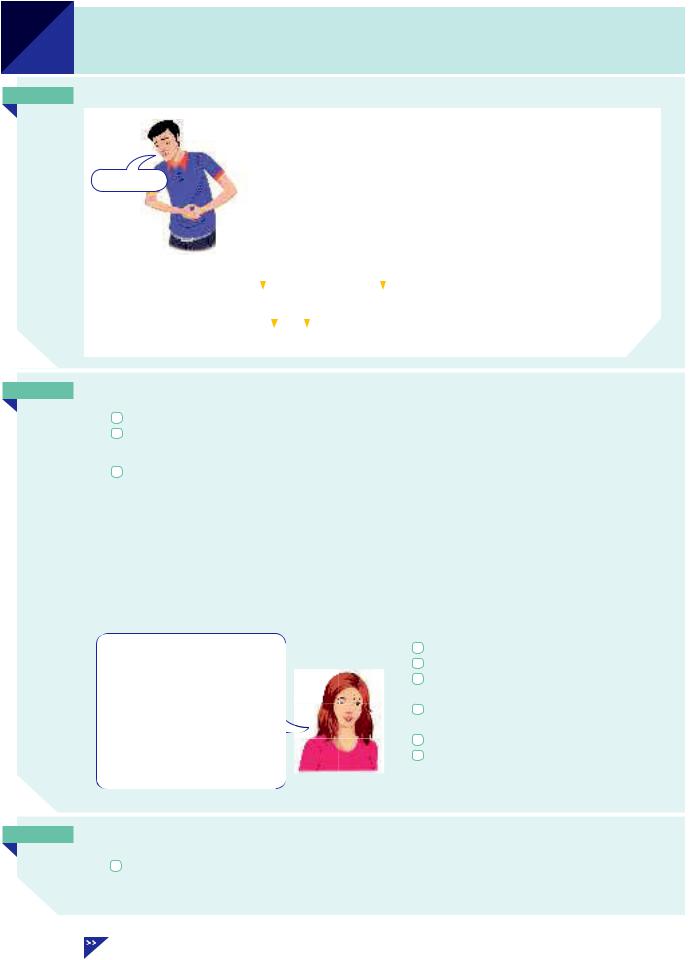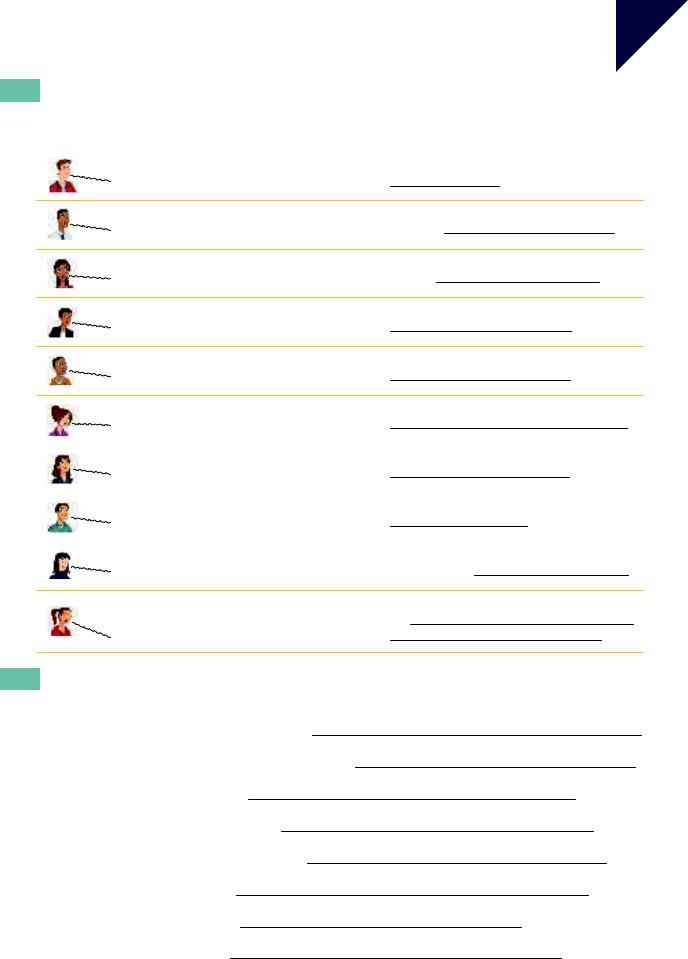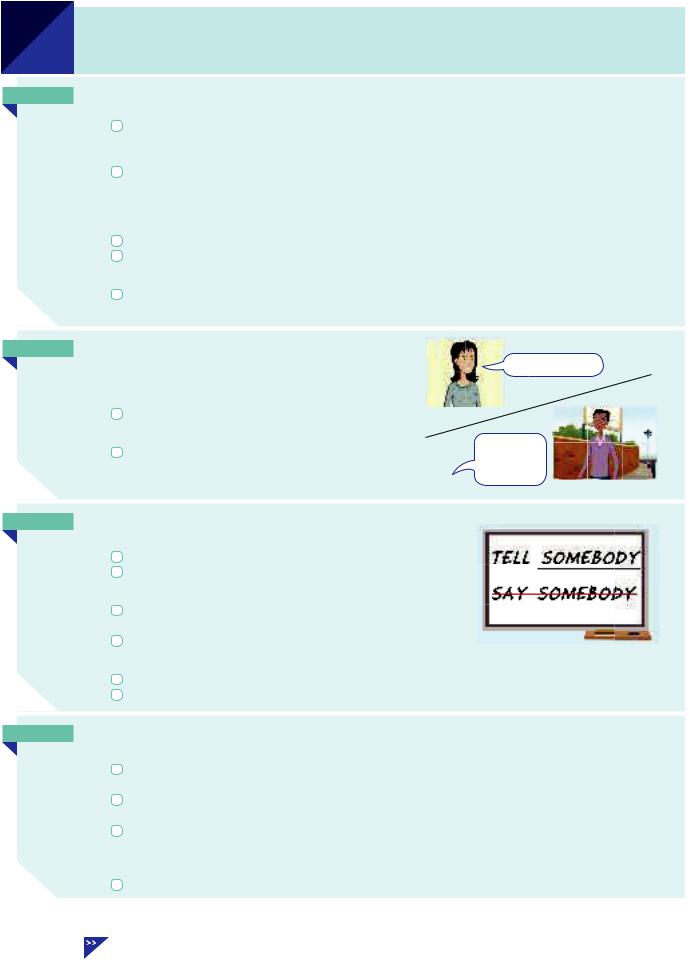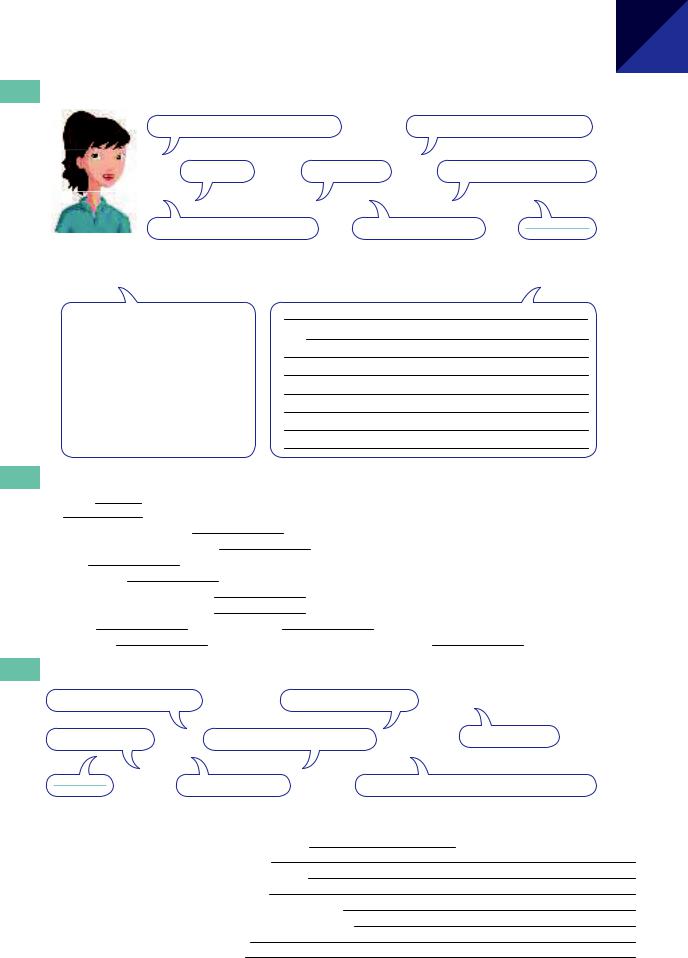
- •Contents
- •Thanks
- •To the student
- •To the teacher
- •3 Present continuous and present simple 1 (I am doing and I do)
- •10 Present perfect continuous and simple (I have been doing and I have done)
- •11 how long have you (been) … ?
- •12 for and since when … ? and how long … ?
- •13 Present perfect and past 1 (I have done and I did)
- •14 Present perfect and past 2 (I have done and I did)
- •15 Past perfect (I had done)
- •16 Past perfect continuous (I had been doing)
- •17 have and have got
- •18 used to (do)
- •19 Present tenses (I am doing / I do) for the future
- •20 I’m going to (do)
- •21 will and shall 1
- •22 will and shall 2
- •23 I will and I’m going to
- •24 will be doing and will have done
- •26 can, could and (be) able to
- •27 could (do) and could have (done)
- •28 must and can’t
- •29 may and might 1
- •30 may and might 2
- •31 have to and must
- •32 must mustn’t needn’t
- •33 should 1
- •34 should 2
- •35 I’d better … it’s time …
- •36 would
- •39 if I knew … I wish I knew …
- •40 if I had known … I wish I had known …
- •41 wish
- •42 Passive 1 (is done / was done)
- •43 Passive 2 (be done / been done / being done)
- •44 Passive 3
- •45 it is said that … he is said to … he is supposed to …
- •46 have something done
- •47 Reported speech 1 (he said that …)
- •48 Reported speech 2
- •49 Questions 1
- •52 Question tags (do you? isn’t it? etc.)
- •53 Verb + -ing (enjoy doing / stop doing etc.)
- •54 Verb + to … (decide to … / forget to … etc.)
- •55 Verb (+ object) + to … (I want you to …)
- •56 Verb + -ing or to … 1 (remember, regret etc.)
- •57 Verb + -ing or to … 2 (try, need, help)
- •58 Verb + -ing or to … 3 (like / would like etc.)
- •59 prefer and would rather
- •60 Preposition (in/for/about etc.) + -ing
- •61 be/get used to … (I’m used to …)
- •63 there’s no point in -ing, it’s worth -ing etc.
- •64 to … , for … and so that …
- •65 Adjective + to …
- •66 to … (afraid to do) and preposition + -ing (afraid of -ing)
- •67 see somebody do and see somebody doing
- •68 -ing clauses (He hurt his knee playing football.)
- •69 Countable and uncountable 1
- •70 Countable and uncountable 2
- •71 Countable nouns with a/an and some
- •74 the 2 (school / the school etc.)
- •75 the 3 (children / the children)
- •77 Names with and without the 1
- •78 Names with and without the 2
- •79 Singular and plural
- •80 Noun + noun (a bus driver / a headache)
- •81 -’s (your sister’s name) and of … (the name of the book)
- •82 myself/yourself/themselves etc.
- •83 a friend of mine my own house on my own / by myself
- •84 there … and it …
- •85 some and any
- •87 much, many, little, few, a lot, plenty
- •90 all every whole
- •91 each and every
- •92 Relative clauses 1: clauses with who/that/which
- •94 Relative clauses 3: whose/whom/where
- •95 Relative clauses 4: extra information clauses (1)
- •96 Relative clauses 5: extra information clauses (2)
- •97 -ing and -ed clauses (the woman talking to Tom, the boy injured in the accident)
- •98 Adjectives ending in -ing and -ed (boring/bored etc.)
- •99 Adjectives: a nice new house, you look tired
- •100 Adjectives and adverbs 1 (quick/quickly)
- •102 so and such
- •104 quite, pretty, rather and fairly
- •105 Comparative 1 (cheaper, more expensive etc.)
- •106 Comparative 2 (much better / any better etc.)
- •107 Comparative 3 (as … as / than)
- •108 Superlative (the longest / the most enjoyable etc.)
- •109 Word order 1: verb + object; place and time
- •110 Word order 2: adverbs with the verb
- •111 still any more yet already
- •112 even
- •114 in case
- •116 as (as I walked … / as I was … etc.)
- •117 like and as
- •119 during for while
- •121 at/on/in (time)
- •122 on time and in time at the end and in the end
- •123 in/at/on (position) 1
- •124 in/at/on (position) 2
- •125 in/at/on (position) 3
- •126 to, at, in and into
- •127 in/on/at (other uses)
- •129 Noun + preposition (reason for, cause of etc.)
- •130 Adjective + preposition 1
- •131 Adjective + preposition 2
- •132 Verb + preposition 1 to and at
- •134 Verb + preposition 3 about and of
- •135 Verb + preposition 4 of/for/from/on
- •136 Verb + preposition 5 in/into/with/to/on
- •137 Phrasal verbs 1 Introduction
- •138 Phrasal verbs 2 in/out
- •139 Phrasal verbs 3 out
- •142 Phrasal verbs 6 up/down
- •143 Phrasal verbs 7 up (1)
- •144 Phrasal verbs 8 up (2)
- •145 Phrasal verbs 9 away/back
- •Additional exercises
- •Study guide
- •Key to Exercises
- •Key to Additional exercises (see page 302)
- •Key to Study guide
- •Index

Unit
47 Reported speech 1 (he said that …)
AStudy this example situation:
I’m feeling ill.
You saw Paul yesterday and you want to tell somebody what he said.
There are two ways of doing this:
You can repeat Paul’s words (direct speech): Paul said, ‘I’m feeling ill.’
Or you can use reported speech:
Paul said that he was feeling ill.
PAUL
Compare: |
|
|
|
|
|
|
|
|
|
|
|
|
|
|
|
|
|
|
|
|
|
|
|
|
|
|
|
|
|
|
|
|
|
|
|
direct |
Paul said, ‘ |
I |
|
|
am |
feeling ill.’ |
In writing we use these quotation |
||||
|
|
marks to show direct speech. |
|||||||||
|
|
|
|
|
|
|
|
|
|
||
|
|
|
|
|
|
|
|
|
|
|
|
reported |
Paul said that |
he |
|
was |
feeling ill. |
|
|
||||
BWhen we use reported speech, the main verb of the sentence is usually past (Paul said that … /
I told her that … etc.). The rest of the sentence is usually past too:
Paul said that he was feeling ill.
I told Lisa that I didn’t have any money.
You can leave out that. So you can say: |
|
|
|
Paul said that he was feeling ill. or |
Paul said he was feeling ill. |
||
In general, the present in direct speech changes to the past in reported speech: |
|||
am/is → was |
do/does → did |
|
will → would |
are → were |
have/has → had |
|
can → could |
want/like/know/go etc. → wanted/liked/knew/went etc. |
|||
See also Unit 48A. |
|
|
|
Compare direct and reported speech: |
|
|
|
|
|
|
|
You met Anna. Here are some of |
|
Later you tell somebody what Anna said. |
|
the things she said in direct speech: |
|
You use reported speech: |
|
I’ve lost my phone. |
|
Anna said that she had lost her phone. |
|
I want to buy a car. |
|
She said that she wanted to buy a car. |
|
I can’t come to the party on |
|
She said that she couldn’t come to |
|
|
the party on Friday. |
||
Friday. |
|
|
|
|
|
She said that she didn’t have much |
|
I don’t have much free time. |
|
||
|
free time. |
||
My parents are fine. |
|
||
|
She said that her parents were fine. |
||
|
|
|
|
I’m going away for a few days. |
|
She said that she was going away for a |
|
I’ll phone you when I get back. |
|
few days and would phone me when |
|
|
ANNA |
she got back. |
|
|
|
|
|
|
|
|
|
CThe past simple (did/saw/knew etc.) can stay the same in reported speech, or you can change it to the
past perfect (had done / had seen / had known etc.):
direct Paul said: ‘I woke up feeling ill, so I didn’t go to work.’
reported Paul said (that) he woke up feeling ill, so he didn’t go to work. or
Paul said (that) he had woken up feeling ill, so he hadn’t gone to work.
94 |
Reported speech 2 Unit 48 Reported questions Unit 50B |

Exercises |
Unit |
47 |
|
|
|
47.1You talked to some friends of yours (Paul, Tom, Anna etc.). Read what they said on the let (direct speech). Later (the same day) you tell another friend what they said (reported speech). Complete
the sentences.
direct speech |
reported speech |
|
|
1 you: |
Are you going to work today, Paul? |
paul: |
No, I’m feeling ill. |
Paul didn’t go to work today. He said ill.
2 you: |
Shall we walk to the station? |
tom: |
No, it’s too far. Let’s get a taxi. |
I wanted to walk to the station, but |
|
Tom said |
far. |
3 you: |
Have you been invited to the party? |
anna: |
Yes, but I don’t want to go. |
Anna has been invited to the party but she told me to go.
4 you: |
When are you going away, Dan? |
dan: |
I’ll let you know next week. |
I asked Dan about his travel plans. He said next week.
5 you: |
Do you ever see Rachel these days? |
ben: |
I haven’t seen her for a while. |
I asked Ben about Rachel, but he told me for a while.
6 |
you: |
Where can I borrow a guitar? |
I needed to borrow a guitar and Kate said |
|
|
kate: |
You can borrow mine. |
|
. |
|
|
|
|
|
7 |
you: |
How’s your job, Sue? |
I asked Sue about her job. She said |
|
|
sue: |
I’m not enjoying it very much. |
very much. |
|
|
|
|
|
|
8 |
you: |
Do you still have your car? |
I asked James about his car. He told me |
|
|
james: |
No, I sold it a few months ago. |
a few months ago. |
|
|
|
|
|
|
9 |
you: |
What’s the name of the cafe we went to? |
I asked Sarah the name of the cafe we went |
|
|
sarah: |
I don’t know. |
to but she said |
. |
10 you: |
How many students are there in your |
|
class, Amy? |
amy: |
Twenty. |
I asked Amy about her school and she told me
class.
47.2Somebody says something to you which is not what you expected. Use your own ideas to complete your answers.
1 |
a: It’s quite a long way from the hotel to the city centre. |
|
|
b: Is it? The man on the reception desk said it was only five minutes’ walk. |
|
2 |
a: Sue is coming to the party tonight. |
|
|
b: Is she? I saw her a few days ago and she said she |
. |
3 |
a: Sarah gets on fine with Paul. |
|
|
b: Does she? Last week you said |
each other. |
4 |
a: Joe knows lots of people. |
|
|
b: That’s not what he told me. He said |
anyone. |
5 |
a: Jane will be here next week. |
|
|
b: Oh, really? When I spoke to her, she said |
away. |
6 |
a: I’m going out tonight. |
|
|
b: Are you? I thought you said |
at home. |
7 |
a: I speak French quite well. |
|
|
b: Do you? But earlier you said |
any other languages. |
8 |
a: I haven’t seen Ben recently. |
|
|
b: That’s strange. He told me |
last weekend. |
Additional exercise 25 (page 316) |
95 |

Unit
48 Reported speech 2
AWe do not always change the verb in reported speech. If the situation is still the same, it is not necessary to
change the verb to the past. For example:
direct Paul said, ‘My new job is boring.’ reported Paul said that his new job is boring.
(The situation is still the same. His job is still boring now.) direct Helen said, ‘I want to go to Canada next year.’
reported Helen told me that she wants to go to Canada next year. (Helen still wants to go to Canada next year.)
You can also change the verb to the past:
Paul said that his new job was boring.
Helen told me that she wanted to go to Canada next year.
But if the situation has changed or finished, you need to use a past verb. Compare:
Paul let the room suddenly. He said ‘I have to go.’ (direct speech)
Paul let the room suddenly. He said (that) he had to go. (not has to go)
BYou need to use the past in reported speech when what was said is diferent from what is really true. For example:
RACHEL
You met Rachel a few days ago. She said: Have you heard? Joe is in hospital.
Later that day you meet Joe in the street. You say:
Joe, this is a surprise. Rachel said you were in hospital. (not ‘you are in hospital’ – it’s clear that he isn’t)
Joe is in hospital.
Rachel said you were in hospital
JOE
Csay and tell
If you say who somebody is talking to, use tell:
Rachel told me that you were in hospital. (not Rachel said me) What did you tell the police? (not say the police)
Otherwise use say:
Rachel said that you were in hospital. (not Rachel told that …)
What did you say?
You can ‘say something to somebody’:
Anna said goodbye to me and let . (not Anna said me goodbye) What did you say to the police?
DWe say ‘tell somebody to …’ and ‘ask somebody to …’ .
Compare direct and reported speech:
direct |
‘Drink plenty of water,’ the doctor said to me. |
reported |
The doctor told me to drink plenty of water. |
direct |
‘Don’t work too hard,’ I said to Joe. |
reported |
I told Joe not to work too hard. |
direct |
‘Can you help me, please,’ Jackie said to me. |
reported |
Jackie asked me to help her. |
You can also say ‘Somebody said (not) to do something’:
Paul said not to worry about him. (but not Paul said me)
96 |
Reported speech 1 Unit 47 Reported questions Unit 50B |

Exercises
48.1 Here are some things that Sarah said to you earlier:
I’ve never been to the United States. |
I don’t have any brothers or sisters. |
|
I can’t drive. |
I don’t like fish. |
Jane has a very well-paid job. |
Unit
48
|
I’m working tomorrow evening. |
Jane is a friend of mine. |
Dave is lazy. |
|
But later Sarah says something diferent to you. What do you say? |
|
|||
|
Sarah |
|
|
You |
1 |
Dave works very hard. |
But you said he was lazy. |
|
|
2 |
Let’s have fish for dinner. |
But |
|
|
3 |
I’m going to buy a car. |
|
|
|
4Jane is always short of money.
5 |
My sister lives in Paris. |
6 |
I think New York is a great place. |
7Let’s go out tomorrow evening.
8 I’ve never spoken to Jane.
48.2Complete the sentences with say or tell (in the correct form). Use only one word each time.
1 Anna said goodbye to me and let .
2us about your holiday. Did you have a nice time?
3 |
Don’t just stand there! |
|
something! |
|
|
4 |
I wonder where Sue is. She |
she would be here at 8 o’clock. |
|
||
5 |
Dan |
me that he was bored with his job. |
|
||
6 |
The doctor |
|
that I should rest for at least a week. |
|
|
7 |
Gary couldn’t help me. He |
|
me to ask Chris. |
|
|
8 |
Gary couldn’t help me. He |
|
to ask Chris. |
|
|
9 |
Don’t |
anybody what I |
. It’s a secret just between us. |
||
10 |
‘Did Kate |
|
you what happened?’ ‘No, she didn’t |
anything to me.’ |
|
48.3 The following sentences are direct speech:
Don’t wait for me if I’m late. |
Mind your own business. |
|
|
Please slow down! |
Can you open your bag, please? |
Don’t worry, Sue. |
|
|
|||
Hurry up! |
Will you marry me? |
Do you think you could give me a hand, Tom? |
|
Now choose one of these to complete each of the sentences below. Use reported speech.
1 |
Will was taking a long time to get ready, so I told him to hurry up . |
|
2 |
Sarah was driving too fast, so I asked |
. |
3 |
Sue was nervous about the situation. I told |
. |
4 |
I couldn’t move the piano alone, so I |
. |
5 |
The security guard looked at me suspiciously and |
. |
6 |
The man started asking me personal questions, so I |
. |
7 |
Carl was in love with Maria, so he |
. |
8 |
I didn’t want to delay Helen, so I |
. |
Additional exercise 25 (page 316) |
97 |
